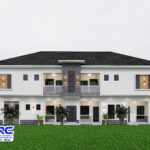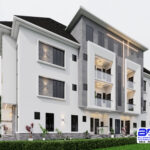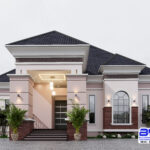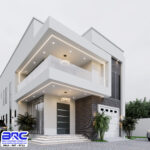Residential buildings are important for meeting the housing needs of Nigeria’s growing population.
Table of Contents
ToggleBut building these homes isn’t easy. Many obstacles stand in the way, making it
difficult to develop quality housing. These challenges range from regulatory hurdles to financial
issues, infrastructure problems, land and legal complications, environmental concerns, and
technological limitations.
It becomes important to understand these setbacks. If we don’t address these problems, the
housing deficit will continue to grow. This can lead to overcrowded and poorly built homes.
Awareness of these issues can guide policymaking and attract investment by creating a stable
environment for developers and investors. Now, let’s look at each setback in detail.
Regulatory Setbacks
One major hurdle is regulatory setbacks. In Nigeria, building codes and regulations are often
stringent and outdated. These rules aim to ensure safety and standardization, but they can be
complex and hard to navigate. Compliance takes a lot of time and resources,
causing delays and increasing costs.
The permitting process is another challenge. It is slow and cumbersome, requiring approvals
from various government agencies. This bureaucratic maze can take months or even years to
navigate, leading to significant project delays. Corruption and inefficiency within permitting
agencies make it even harder to get necessary approvals quickly.
Zoning laws also play a role. These laws regulate land use, determining what types of buildings
can be constructed in specific areas. Unfortunately, these laws are often outdated and poorly
enforced, leading to conflicts and confusion. This can halt or delay construction projects,
affecting the quality of residential areas.
Financial Setbacks
Now, let’s talk about money. Financial setbacks are a major issue for residential buildings in
Nigeria. The high cost of building materials is a significant barrier. Prices for essentials like
cement, steel, and timber are often high due to import dependencies and fluctuating exchange
rates. This makes building a home very expensive.
Access to financing is another big problem. High-interest rates and stringent loan requirements
make it difficult for developers to get the funds they need. Many potential homeowners also
struggle to access mortgage financing due to inadequate credit systems and lack of financial
literacy. This limits the ability to fund projects and meet housing needs.
Economic instability and inflation further complicate things. Inflation drives up the cost of
building materials and labor, while economic uncertainty deters investment. Developers and
investors hesitate to commit to long-term projects in an unpredictable economic environment.
Stabilizing the economy and controlling inflation are crucial for creating a better environment for
residential development.
Also read – All about Construction Loans and How to get it in Nigeria
Infrastructure Setbacks
Infrastructure setbacks are another major challenge. Poor road networks make it difficult to
transport building materials to construction sites. This leads to delays and higher costs.
Inaccessible locations deter potential investors and developers from undertaking projects in those areas.
Improving road networks is vital for facilitating construction and enhancing the livability of residential areas.
Inconsistent power supply is another significant issue. Reliable electricity is essential for
construction activities and for making homes habitable. However, frequent power outages and
inadequate power distribution disrupt construction schedules and increase costs.
Developers often have to invest in alternative power sources, which adds to project expenses.
Water supply issues also pose a challenge. Many parts of Nigeria face inadequate water supply
infrastructure, making it difficult to meet construction and residential needs. Developers often
invest in private water sources, which increases costs. For residents, unreliable water supply
affects daily living and hygiene, leading to health issues and reduced quality of life.
Land and Legal Setbacks
Land and legal setbacks are critical issues as well. Land ownership disputes are common,
stemming from a complex and opaque land tenure system. These disputes can halt construction
projects and result in lengthy legal battles, causing significant delays and financial losses for
developers. Establishing a transparent and efficient land tenure system is essential for reducing
conflicts and promoting residential development.
The land acquisition process is also complicated and time-consuming. Obtaining land titles and
permits involves navigating multiple government agencies, which can be bureaucratic and
inefficient. Corruption and lack of transparency further complicate the process, increasing
project costs. Simplifying and streamlining land acquisition procedures is essential for
encouraging residential development.
An inadequate land registration system adds another layer of complexity. The lack of a
comprehensive and accessible land registry creates uncertainty and increases the risk of fraud.
Developers and potential homeowners face challenges in verifying land ownership and title
deeds. Modernizing the land registry and making it accessible to the public can help reduce
disputes and promote confidence in the property market.
Environmental and Social Setbacks
Environmental and social setbacks are also significant. Flooding and erosion are major issues in
many parts of Nigeria. These natural disasters can damage infrastructure, displace residents, and
increase construction costs. Developers must invest in flood mitigation and erosion control
measures, which add to project expenses. Implementing effective environmental management
practices and investing in resilient infrastructure are essential for mitigating these risks.
Security concerns are another major setback. High crime rates and incidents of violence deter
potential investors and residents from moving into certain areas. Developers must invest in
security measures, such as gated communities and private security personnel, to attract buyers
and tenants. Ensuring the safety of workers and protecting assets is also a significant challenge.
Improving overall security and law enforcement is crucial for promoting residential development.
Cultural and community resistance can also pose challenges. Local communities may resist
development due to concerns about displacement, loss of cultural heritage, or changes to their
way of life. This resistance can lead to conflicts, project delays, and increased costs. Engaging
with communities and addressing their concerns is essential for the success of residential
projects. Developers must adopt inclusive and participatory approaches to gain community
support and ensure that development benefits local residents.
Also read – I Want To Build a House on My Land Where Do I Start
Technological Setbacks
Technological setbacks are another barrier to residential building projects in Nigeria. Access to
modern construction technology is limited, making it difficult to improve efficiency, reduce
costs, and enhance the quality of buildings. Many developers lack the resources or knowledge to
adopt advanced construction techniques and equipment.
The reliance on traditional construction methods leads to longer project timelines and higher
labor costs. The quality of construction may also suffer, resulting in buildings that do not meet
modern standards. Promoting the adoption of construction technology and providing training for
developers and workers can help overcome these challenges.
A skilled labor shortage further complicates things. The construction industry requires a
workforce with specialized skills in various trades, but there is a significant gap between the
demand for skilled labor and the available supply. This shortage affects the quality and
efficiency of construction projects, leading to delays and increased costs. Investing in vocational
training and education programs is essential for developing a skilled workforce.
Outdated construction methods are another issue. Many residential building projects in Nigeria
still rely on methods that are less efficient and more labor-intensive. These traditional methods
result in longer project timelines, higher costs, and lower-quality buildings. Embracing modern
construction techniques and materials is crucial for improving the efficiency and quality of
residential development.
Solutions and Recommendations
So, what can be done to overcome these setbacks? Government intervention and policy reform
are essential. Streamlining regulatory processes, simplifying land acquisition procedures, and
updating building codes can create a more conducive environment for development.
Implementing policies that promote affordable housing and provide incentives for developers
can also boost the residential construction sector.
Investing in infrastructure is important. Improving road networks, power supply, and water
infrastructure can facilitate construction activities and enhance the livability of residential areas.
Public-private partnerships can be an effective way to mobilize resources and expertise for
infrastructure development.










